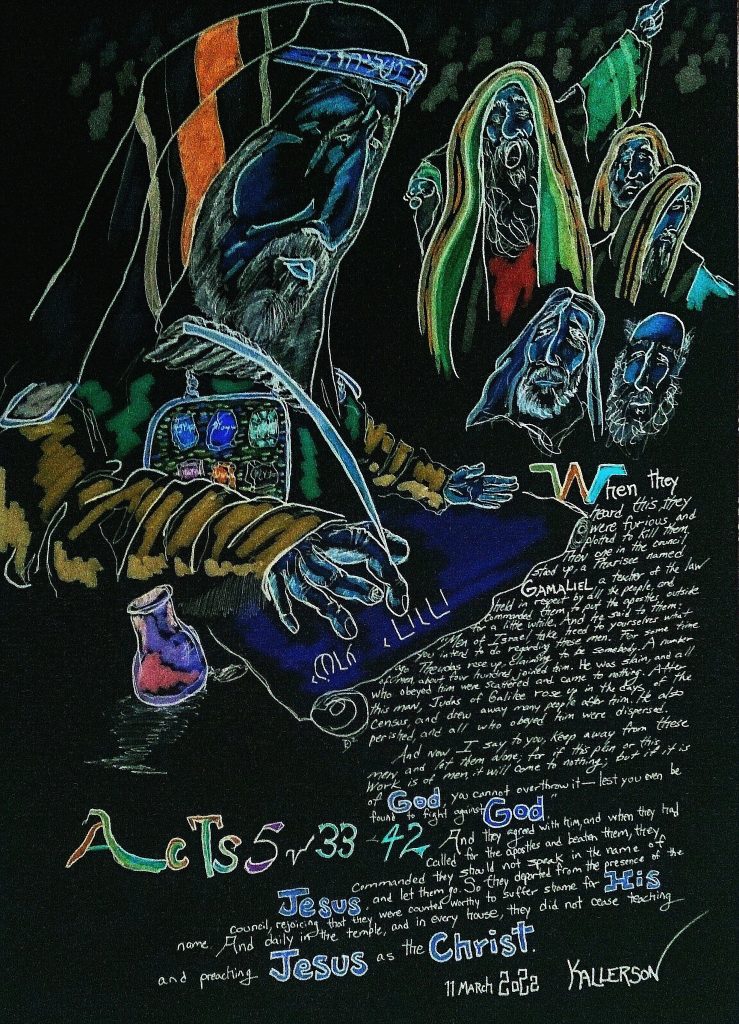Negative color image.
Sunday, 13 March 2022
When they heard this, they were furious and plotted to kill them. Acts 5:33
Note: You can listen to today’s commentary courtesy of our friends at “Bible in Ten” podcast. (Click Here to listen).
You can also read this commentary, with music, courtesy of our friends at “Discern the Bible” on YouTube. (Click Here to listen), or at Rumble (Click Here to listen).
The apostles just offended the council with their words concerning Jesus, particularly that God had given the Holy Spirit to those who obey Him. That, in particular, must have really set them off. These were Israel’s leaders! These were those who sat in Moses’ seat! It was they who explained the law to the people! And yet, these men before them – mere Galileans by the way! – claimed that it is they who stood in favor with God. As such, Luke next records, “When they heard this.”
The entire discourse was probably upsetting to the council – 1) We ought to obey God rather than men. 2) God raised up Jesus whom you murdered. 3) Jesus has been exalted at the right hand of God. 4) It is through Jesus that repentance to Israel and forgiveness of sin comes. 5) The Holy Spirit is given to those who obey Him.
Each point was a direct poke at those of the council. By the time the apostles arrived at the last point, the minds of those on the council would be enraged at what they had heard. As such, Luke next says that “they were furious.”
This is a new word to Scripture, diaprió. It is found only here and in Acts 7:54. It comes from two words signifying “through” and “cut with a saw.” Hence, it signifies “sawn in two.” It is a state where a person feels they have been cut right in two, right down the middle, when overcome with grief or rage.
In the case of the council, one can imagine a saw cutting through their minds as bits fly off in different directions. The more words they heard, the more their minds would be drawn apart. At some point, in this case, the mentioning of receiving the Spirit for those who obeyed, their minds would become completely enraged and disjointed. In this state, Luke says that they “plotted to kill them.”
The verb is imperfect. It says that they “were plotting to kill them.” They were sitting there, stewing away at what they heard, and with every new indictment against them, each person was thinking of how he could use the law to do away with this group of arrogant miscreants. If the law was incapable of removing them, they certainly were thinking about how they could devise their own plan to do so. This seems evident because this is exactly what they later attempted to do to Paul, as is recorded in Acts 23:12-15.
What is important to remember, and which is a point upon which the council’s evaluation of the matter hinges, is that these apostles before them had been arrested and locked securely in the prison just a few hours before. And yet, they were not in the prison despite it being shut securely and with the guards still standing outside. Further, they had not run away from Jerusalem but had gone to its most prominent spot, the temple, in order to continue preaching.
What occurred there stood as a witness and a testimony to the truth of the words that the apostles spoke. The ignoring of each such validation of their message is another reason to justify the cutting off of the nation for their stubborn refusal to accept the truth of God in Christ Jesus.
Life application: The apostles said nothing wrong, and each point presented to the council was true. Many on the council would even know this. It is true that every person should obey God rather than men. It is true that those on the council had murdered Jesus. It is true that if He had been raised (which is what they knew and tried to cover up), that He was exalted at the right hand of God. It is also true that if Jesus had been raised, then He was the prophesied Servant of Isaiah 52/53 who would first die for the transgressions of the people. And it is true that the Holy Spirit had come upon those who believed in Jesus (as is carefully recorded in Acts 2 and as was validated by the signs, wonders, and miracles performed by the apostles).
Despite this, hearing the words of the apostles was enough to enrage the council. As such, we must remember that quite often the truth hurts. Thus, when we are presenting the truth, it may get us into trouble. That has been proven true throughout human history. But it is better to be persecuted for the truth than it is to hide safely behind lies.
Be people of truth, let things fall where they fall, and be pleased in never compromising the truth of the gospel of Jesus Christ. This life is short, we will soon go the way of all the world, and we will stand before the Lord for our judgment. It is right that we should do so having been truthful and having been faithful. May it be so.
Lord God Almighty, help us to never hide the truth when it should be presented. Help us to never waver in our convictions about what is right and proper. And, Lord, help us to be people of integrity in all we do. To Your glory, we pray. Amen.

